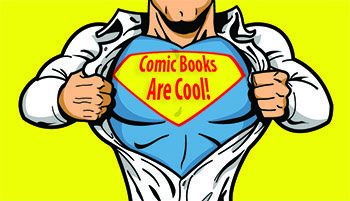Introduction
For some people, the word "nerd" might bring to mind images of a skinny teenage boy with braces and Coke-bottle glasses. The nerd was once a specific brand of social outcast: one who never talked to girls, did well in science class, and read comic books religiously. Well, I have news for you: the nerd is no more. Outcast boys have learned that there are also outcast girls, that being good at science is no longer something to be embarrassed about, and that reading comic books is something everyone can enjoy.
Still, not everyone has hopped on the comic book and graphic novel train. Some people don't take comic books as seriously as they take other books, and most people don't realize the benefits of reading these visual masterpieces. So, what are some of the benefits of reading comic books?
#1: Comic Books Help People Learn to Love Reading
Lots of people, especially young readers who are struggling to improve their reading skills, can benefit from the visual format of comic books and graphic novels. With their intense visuals and focus on plot and characters, comic books can be much more engaging than other literary media, such as novels or short stories.
Comic books may also help people develop the reading skills required to comprehend texts with higher levels of difficulty. When people read comic books, they learn how to process information differently, as we'll explore in the following section. Further, comic books and graphic novels can help people learn information that they may otherwise find boring, such as stories from history or other educational information.
#2: Comic Books Help Us Think Differently
According to University of Windsor English professor Dale Jacobs (2007), comic books require readers to create meaning using "multiple modalities." Readers of comic books must process all the different components—visual, spatial, and textual—of what they are reading and integrate these components into one solid understanding of the story. This means that, even though comic books may appeal to readers for the same reason these individuals are drawn to other forms of entertainment, such as television and video games, reading these books actually involves much more complex processing. More research remains to be done regarding the neurological benefits of reading comic books, but it is evident that there is far more to this genre than simply "looking at pictures," as some critics of comic books believe.
#3: Stories May Be Good for Your Brain
No doubt you've been told that reading is good for you. Growing up, you were likely told that the more you read, the better a reader you would become. However, if you aren't interested in being a good reader in the first place, this really isn't much incentive to read more. But what if reading were good for more than just getting better at reading itself?
Neuroscientific research by Berns, Blaine, Prietula, and Pye (2013) indicates that reading stories actually has a noticeable effect on brain function. This study showed how reading a compelling novel changed participants' neuron activity not only while they were reading but also for several days after they finished the novel that was assigned to them. Stories can actually change the ways in which our brains function and the ways in which we think—and tell me, what's a more story-based medium than comic books?
#4: Comic Books Are Cool
 Teenage Mutant Ninja Turtles. Batman. Wolverine. Green Lantern. Superman. The Incredible Hulk. Men in Black. Captain America. The Fantastic Four. Iron Man. Spider-Man.
Teenage Mutant Ninja Turtles. Batman. Wolverine. Green Lantern. Superman. The Incredible Hulk. Men in Black. Captain America. The Fantastic Four. Iron Man. Spider-Man.
Unless you've been living under a rock, you've likely heard of all of these characters. You've probably even seen most of their movies. You know why? Because superheroes are cool. And where do superheroes originate from? Comic books. If you enjoy big superhero blockbusters, such as The Avengers or The Dark Knight, there's no reason you won't enjoy the stories from whence these adaptations came. There is a whole culture to explore surrounding comic books and their adaptations; why not join the fun?
#5: Comic Books Are More than Just Superhero Stories
Okay, so maybe you're not into superheroes. That's fair. But did you know that you can read comic books and graphic novels about lots of other topics, too? There are tons of comic books out there sans evil villains or vats of toxic waste, such as the Scott Pilgrim series, The Walking Dead, The Sandman, and many more.
There are also tons of great graphic novels and graphic nonfiction books out there, such as Alison Bechdel's autobiography, Fun Home; Marjane Satrapi's Persepolis; and many more. Many of these stories, just like your favorite books, explore weighty themes and feelings. The visual nature of graphic novels allows you, as the reader, to experience these themes in different ways than you do when reading a traditional book. Don't limit yourself to regular prose; explore everything the world of comic books and graphic novels has to offer. You probably won't like everything you encounter, but then again, you don't like all the books out there, either. You just have to explore and find what's right for you!
Image source: coombesy/Pixabay.com, KennyK/Shutterstock.com





